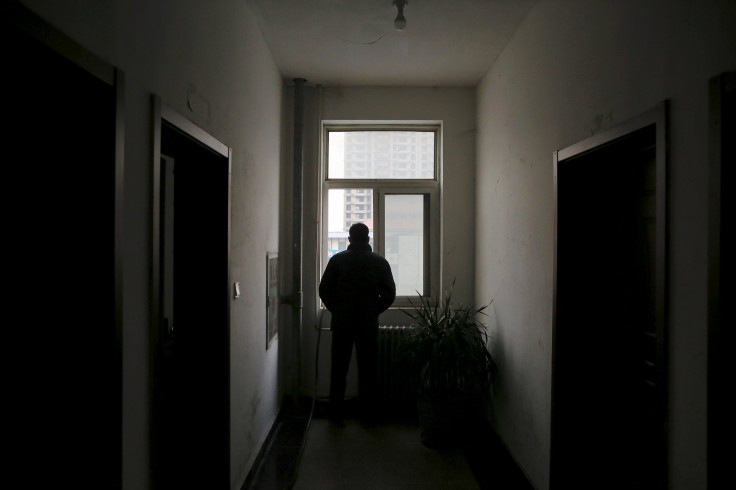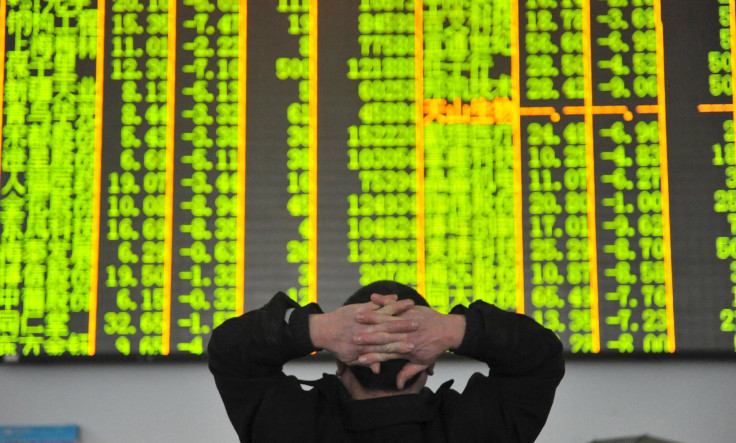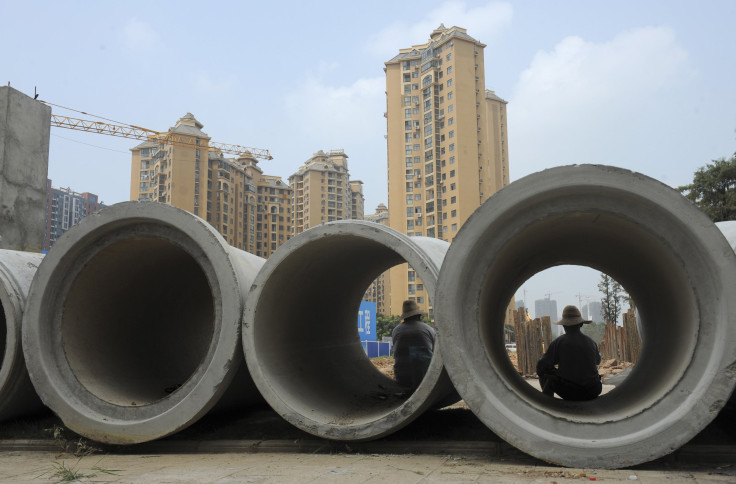Chinese New Year Not So Happy For China’s Growing Number Of Unpaid Workers

SHANGHAI — On a side street in China's biggest metropolis, workers in white T-shirts painted with red slogans stand on the sidewalk outside a private club, accompanied by a pair of uniformed policemen talking anxiously into their radios. The slogans call for their employer, which has closed down, to pay them the back salary they are owed.
It’s an unusual sight in the country's financial hub, just a few blocks from the bright lights of the Nanjing Road, an upscale shopping street. But across China, as many of the nation's 160 million rural migrant workers prepare to head home from the cities to spend Chinese New Year with their families, disputes about unpaid wages are becoming increasingly common, amid China's slowing economy. According to China Labor Bulletin — a Hong Kong-based monitoring group set up by Han Dongfang, a worker activist during the 1989 Tiananmen protests — there were 774 labor strikes across China in December and January, up from 529 in the previous two months, most of them over wage arrears. In the last week of January alone, just before most workers set off home for this week’s new year celebrations, CLB reported some 100 such protests in different parts of the country.
It has only added to official anxiety about social unrest — as highlighted by the recent unprecedented official crackdown on nongovernmental labor mediation groups in Guangdong province, home to much of China’s manufacturing. Zeng Feiyang, head of NGO the Panyu Migrant Workers’ Center in the provincial capital Guangzhou, and a respected, experienced activist, is under arrest along with two others, charged with “gathering a crowd to disturb social order,” and has been attacked by China's official media.

Activists have warned that this tough line on labor NGOs could make it harder to resolve such disputes peacefully in the future, leading to further problems as the economy slows. And a lack of protection of workers’ rights, possibly leading to more unpaid wages, could also undermine the Chinese government’s plans to boost the economy by selling off part of the nation's vast inventory of unsold housing to rural migrants.
As they always do around Lunar New Year, China’s official media have highlighted calls by the authorities to ensure that workers are paid on time. This year the calls have more impetus following a recent case in the northwestern region of Ningxia , where a man who worked as a labor contractor set fire to a bus killing 17 people and injuring 33, apparently in protest of the failure of a construction company to pay him so he could pay his workers.
But CLB’s Geoff Crothall says the cases of wage arrears seem to have increased this year, with the number of strikes his organization reports a “snapshot” of the scale of the problem. “They’re just the ones we can spot that are posted on social media," he says. "There are some that we don’t log because we can’t verify them.” And he suggests that many other protests are never posted on social media, while in other cases workers simply accept arrears without protesting. “It’s definitely getting worse,” he says.
Wage arrears has long been endemic in China's construction industry, Crothall told International Business Times. A slowdown in growth in new construction projects over the past year has added to the problem, which is compounded, he said, by the fact that many construction workers are paid “once at end of year or at the end of the project,” receiving only “pocket money” in between. Between Jan. 29 and Feb. 1 of this year, CLB logged protests by construction workers over unpaid wages in more than half of China’s 31 provinces and regions. Some marched in the streets, blocking them off, only to be arrested, according to CLB data. In other cases, workers did not take to the streets but rather occupied their bosses' offices in the hope of being paid, Reuters reported recently.

The problem is not only wage arrears but manufacturing more generally, with a growing number of factory closures in the Pearl River Delta, Guangdong's manufacturing hub — closures which are often made more painful for workers by the way they are handled by the companies' management.
“The standard procedure for many factories before they close down is to stop paying workers for a month or two months, sell off the assets and machinery, and then the boss [will] disappear,” Crothall said. In one recent case in Chaozhou in eastern Guangdong, workers from a shoe factory staged a protest over unpaid wage arrears after their boss fled. Other workers, meanwhile, are reported to have been told to go home early for the New Year to help their employers save money at a time of flagging orders.
And “it’s not just manufacturing and construction," Crothall added, noting that China's mining sector and steel sectors have been particularly hard-hit, with a fall in demand for such commodities as a result of the general economic slowdown. One state-owned coal mine, Longmay, in northeast China, announced last year that it planned to lay off 100,000 workers in the coming years.
When it comes to layoffs at such big state-run employers, the authorities may take more care to ensure that the affected workers receive back pay and welfare payments — after the painful lessons of the late 1990s, when tens of millions of state enterprise staff were laid off, and many took to the streets of northeast China to protest that they had not received the money they were due.

"They have to some extent learnt lessons from the massive layoffs of the end of the '90s and early 2000s that if you do just throw people on the scrap heap with no real compensation you haven’t got rid of the problem, you’ve just created another problem, and it’s just going to come back to bite you,” Crothall explained.
But overall, despite some initial progress after the passing of China's revised labor contract law in 2008, Crothall says official commitment to protection of the rights of workers, particularly those employed by private businesses, is often limited:
“Every Chinese New Year the boss of a county or city will come under pressure from higher level officials to make sure everyone’s paid – and they’ll put pressure on the local officials, and those guys will then put pressure on the factory owners and property developers to pay up," he told IBT. "And then they announce in the media that we’ve recovered 40 million yuan in back pay — and then the same thing will happen again next year.”
The bottom line is that economic growth remains a top priority for local governments and officials, despite some recent talk of prioritizing environmental protection as a way of assessing officials' achievements:
“The basic system is not changing — employers can basically do whatever they want," Crothall said. Local government bureaucrats are unlikely to push employers to obey the law because of the system of cronyism whereby factory owners are good friends with mayors and their deputies.

It's not all catastrophe: Demographic issues -- with fewer young workers coming onto the employment market than a decade ago -- and growth in infrastructure construction and particularly the service sector mean that China's overall employment situation is still one where opportunities are being created, according to Crothall.
But, as IBT has previously reported, the caveat is that service jobs tend pay less than manufacturing jobs, and therefore do less to boost consumption. There is also evidence that some companies in sectors hailed as saviors of China's economy, such as e-commerce, are increasingly laying off workers.
“If you look at some of the companies that are having problems, a lot of them are start-ups, in areas like e-commerce or robotics, all these bubble industries that everyone rushes into without any real planning or forethought," Crothall said, adding that such companies often hire workers on short-term contracts, giving them little protection.
Such problems with wages and job security could undermine attempts to boost domestic consumption along with the government’s plan to urbanize 100 million people by end of decade, and encourage migrants to buy up surplus housing — something Chinese experts have already said will be hard to implement due to the high cost of housing compared to average workers' wages.

Observers say the detention of the worker activists in Guangzhou also highlights a growing focus on reining in the rights of workers, rather than encouraging them to seek better treatment or higher wages. Guangdong, of which Guangzhou is the provincial capital, has generally been seen as one of the areas of China where workers were most empowered – with better access to information about their rights, thanks to civil society groups like the Panyu Migrant Workers Center, and, in some cases, tacit support from the local branch of China's official labor union.
Crothall, whose organization has long cooperated with the detained activists, says that previously, despite “some low level harassment ... the Guangdong authorities begrudgingly tolerated the Panyu center and other NGOs.”
Now, however, China's official news agency and other central media have accused Panyu director Zeng Feiyang of various personal misdemeanors, as well as running an illegal organization, receiving foreign funding, and stirring up trouble where none existed.
Human rights group Amnesty International has described this as a “smear campaign.” Crothall said Zeng was “widely acknowledged as one of the most experienced and trustworthy labor activists in the Guangzhou region”, and describes him as a moderate intermediary who encouraged negotiation between workers and employers, and certainly “not a rabble rouser.” Workers involved in a dispute at Guangzhou's Lide shoe factory last year, which the government accused Zeng of stirring up, have also spoken of his moderate approach.

Observers say the crackdown is a further sign of the Beijing government's growing intolerance of civil society activism, amid worries about a more vocal population, and tensions over the economy and the widening wealth gap between China's rich and poor. Crothall says it is also designed as a warning to other activists, many of whom are already keeping a lower profile.
Taking people like Zeng out of the equation could add to labor tensions, Crothall warns, at a time when smoothing such friction could be increasingly important if economic problems continue to afflict the manufacturing sector.
“One of the main things the Panyu centre and these other groups do is to emphasize that workers’ collective action will be much more successful if you stay within legally prescribed parameters, and don’t do anything to antagonize the local government and police,” Crothall said.
According to one Guangdong factory worker, without such NGOs to advise them, "Workers will either silently swallow insult and humiliation or alternatively they will do much more extreme things, such as blocking roads in order to get back their money, since there will be no one to tell them what they should and should not do and how to fight for their rights legally."
As China's economy feels the impact of slowing growth, its government is going to feel the growing impact of workers' anger.
© Copyright IBTimes 2024. All rights reserved.





















